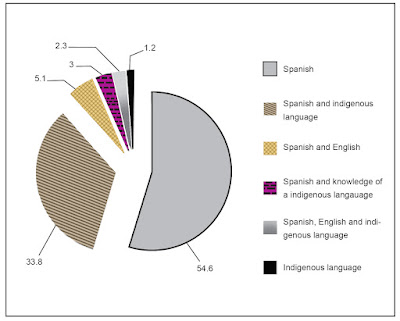Language Matters
 |
| "Linguistic Diversity in Children in Indigenous Elementary Schools in Baja California (percentages)" from a study done by Laura Velasco Ortiz and Daniela Renteria from the Autonomous University of Baja California. Creative Commons license 4.0 International |
Even in the U.S., immigrant parents sometimes don't teach their children their own native languages for fear they'll be discriminated against. My mother often asks me to make phone calls for her because some people have trouble understanding her accent over calls. Siri certainly has trouble, as does Alexa. We laugh about it most nights because it's funny how she'll say something like "Siri, play 'American Housewife'" or one of our family T.V. shows and Siri'll come up with something entirely wrong. My mom always has a good sense of humor relating to herself. It's easy to make her laugh with silly little things, like how Siri doesn't quite understand her. She made it a game, almost. There was one time, when I was a freshman in High School, when, during a neighborhood potluck, one of our neighbors was speaking to her slowly, as if she thought my mom didn't speak English well enough to understand her. It stopped being a game then. I don't remember how my mom reacted, but I remember how annoyed my dad, sister, and I were.
Codeswitching is also an important result of how hearing affects the way we experience the world. Listening to my friend slip effortlessly into Jamaican Patois while on the phone with her mother is different-but-not from the way my roommate moves back and forth between Haitian Creole and English when she's talking to her mother as opposed to talking to me. Even the way we speak when we're around strangers as opposed to our friends changes. My voice goes up much higher, enough so that I can't have a phone call around my friends without them teasing me after. I lose that sort of dragged-out, rounder L.A. talk influenced by the rhythm of speaking Spanish. Around familiar company, everything returns again as if nothing happened. If I spend enough time with people, I'll start adapting to their way of speaking, their rhythms, and their vocabulary.
Ackerman's chapter brought up this memory, along with the idea that what people hear can often affect the way they treat others. Our neighbor heard my mom's accent, then spoke to her differently than she would my white, somewhat mono-lingual father. Sound is important to the way we move through the world, but not necessarily in the way I thought of first.

This was super interesting, Ellie! I also find it compelling how we adapt our ways of speaking when spending time with certain people. I definitely have noticed that I incorporate my friends' vocabulary into my own.
ReplyDelete